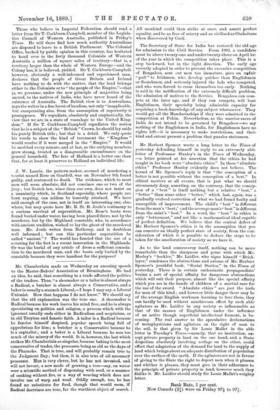Mr. Herbert Spencer wrote a long letter to the Tithes
of yesterday defending himself in reply to an extremely able letter of Profeassor Huxley's in the Times of Wednesday, —a letter pointed at his assertion that the ethics he had taught in his book were "absolute ethics." In these "absolute ethics" Professor Huxley evidently does not believe. The kernel of Mr. Spencer's reply is that "the conception of a better is not possible without the conception of a best." In ethical matters at all events, that is just what we should strenuously deny, asserting, on the contrary, that the concep- tion of a " beat " is itself nothing but a relative "best," a " better " than some other "better," which last, again, was a gradually evolved correction of what we had found faulty and susceptible of improvement. The child's " best " is different from the man's " best ;' Lnd the average man's " best " is different from the saint's "best." In a word, the " best " in ethics is only " bettermost," and not like a mathematical ideal capable of perfect definition. We believe that the central defect of Mr. Herbert Spencer's ethics is in the assumption that you can conceive an ideally perfect state of society, from the con- sideration of which it is possible to deduce the steps to be taken for the amelioration of society as we have it.


















































 Previous page
Previous page